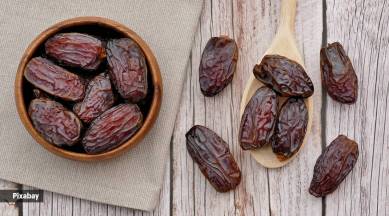Can dates spike blood sugar levels? Do they affect weight loss?
Dates are nutrient-dense and if they are had rightly, factored in as part of your daily calorie allowance and not as an add-on to other carbohydrates, then they make for an excellent energy-giving serving, says Dr Seema Gulati, National Diabetes, Obesity and Cholesterol Foundation (NDOC) Centre for Nutrition Research

There are a lot of misconceptions with regard to dates, about whether they should be had in summers or whether those living with Type 2 diabetes should take them. Scientifically speaking, dates can be had in all seasons. Many believe that they are heat-generating and, therefore, best avoided as a summer fruit. But in reality, animal foods have a higher degree of thermogenesis, which is defined as the dissipation of energy through the production of heat. Dates are very low in protein and the heat they generate do not cause any harm. In fact, one should not ignore their larger nutritional value.
There is also a common belief that people with Type 2 diabetes must avoid consumption of dates. But a recent review of research findings shows that eating dates does not have a significant effect on blood glucose, cholesterol, body weight or blood pressure provided they are had in small amounts and at the right stage of maturation. Some studies, in fact, show that if you take the right variety of dates in controlled portions, they may actually prevent blood sugar from spiking. Data shows no negative influence of dates, they do not increase your blood sugar level or lead to weight gain.
monthly limit of free stories.
with an Express account.
Dates are nutrient-dense and if they are had rightly, factored in as part of your daily calorie allowance and not as an add-on, then they make for an excellent energy-giving serving of fruit. About 100 gms of dates yield about 60 to 70 gm of carbohydrates. One date is approximately 15 gm, which is equivalent to 40 to 50 kilocalories (Kcal). Dates are rich in micronutrients like magnesium, selenium, manganese, iron, phosphorus, calcium and potassium. Their glycaemic indices (GI), or how quickly they influence postprandial glucose levels, are low to medium, different varieties swinging between a value of 40 to 75. They are high in fructose, but since it is a naturally occurring sugar, it is difficult to consume it in excess unlike when you have added or free sugars. Dates are high in fibres, which promote satiety, delay digestion, reduce cravings and slow down release of glucose into the bloodstream. They are rich in antioxidants, phenolic compounds, flavonoids and phytosterols that reduce oxidative stress and control inflammation.
If you are wondering how to make dates a part of your daily recommended calorie allowance, it is rather easy. One chapati is 80 Kcal, so subtract the number of chapatis and the portion of rice to accommodate two dates in the day’s meal plan. This golden rule of omission and substitution ensures dates do not increase your sugar levels. The nutritional composition of most date varieties are similar except that their GI differs depending on their fibre load.
According to a Saudi Arabian study, “the rate and the length of time that plasma glucose remains elevated after a meal can modulate various diseases by affecting the magnitude of metabolic pathways and hormones…No significant differences were observed between the different types (highest in Sellaj and Maktoomi, and lowest in Shaqra, Sukkary and Sag’ ai). However, the glycaemic load differs significantly and was lowest in Ajwah and Shaqra… Further studies from the United Arab Emirates compared different classes (Tamer stage) among people with and without Type-2 diabetes and found no differences in glycaemic index between different groups….a study conducted in Egypt concluded that Zaglool dates showed the lowest glycaemic index.”
Another study assessed the effects of Arabic coffee on the GI among healthy individuals and patients with diabetes and found no differences between the groups, indicating that coffee intake with dates fruit might not affect sugar levels. Other researchers found that the GI of dates is not affected when mixed with yogurt. A Canadian study, of course, found that dates had a lower GI than white bread.
While GI is a measure of glycaemic response to iso glucidic foods, it might not represent the true effects of individual servings of different food items. For this you need glycaemic load, which is a measure of the overall effects of standard food portions. Saudi date varieties like Ajwa and Shaqra had low glycemic loads (8.5 and 9.2 respectively).
For dates to be beneficial for your body, it is essential to know which of the 17 varieties of dates works for you as a diabetic, the stage of maturation that determines its calorie load and the quantity that can be had. There are four different stages of dates — Kimri, Khalal, Rutab and Tamer. The GI of various stages of dates are as follows: Rutab (semi-ripe), 47.2; Tamer (fully ripe, traditionally sun-dried), 45.3, and Tamer (commercial), 35.5. The Tamer stage is actually the maturation stage where the date fruit is dried, firm and dark in colour. The Indian variety of dates, Medjool, has a medium glycaemic load.
You should know the right way to have dates. They should be had in their natural form between the semi-ripe and dried stages. Before they are packed, dates have more fibre, about 7 to 15 gm per 100 gm. Processing reduces the fibre content, so avoid packed versions. Dates should be had before exercise, when the fasting blood sugar levels are less. You can even have them after a vigorous workout and toss them up with nuts, which provide healthy fats and protein to reduce the sugar load.